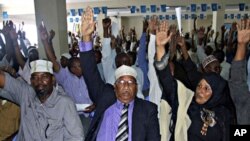Procedural bickering has once again thrown the Somali parliament into a deadlock. With less than one year left on its mandate, the approval of the proposed cabinet as well as the future of the transitional government is in doubt.
Less than one month after being approved by the Somali Parliament, Prime Minister Mohamed Abdullahi Mohamed is now facing stiff political opposition in his race to rebuild the country's shattered government.
Just two weeks ago, Mohamed announced his chosen cabinet members, a pared down list of technocrats drawing heavily from the Somali diaspora. The group, which was cut down to 18 ministers from the previous 39 positions, was widely praised as a competent and promising team to move Somalia forward.
But hopes for Mohamed's tenure as prime minister took a blow Monday after parliament failed to approve his new cabinet. Mirroring the initial vote to approve the premier weeks ago, Monday's session ended in a shouting match over whether the ballot would be cast openly or in secret.
According to reports, fist fights even broke out among the 550-member body, prompting Speaker Sharif Hassan Sheikh Aden to postpone the vote indefinitely.
Since being appointed by President Sheikh Sharif Sheikh Ahmed, Mohamed Abdullahi Mohamed has repeatedly insisted he would form a government based on experience, signaling a departure from the clan politics that have previously dominated the war-torn state.
Somalia's Transitional Federal Government has operated under the "4.5 System" designed to share power equally among the country's four major clans and a coalition of minor groups.
Mohamed's departure from 4.5 has been praised in some circles, but has received a raft of criticism from many in the Somali parliament, who believe the balance is critical to the government's legitimacy.
But Qatar University Somali Analyst Afyare Elmi says such complaints are simply designed to mask vested interests in corruption.
"There is no legitimate issue they have against the cabinet," Elmi said. "The problem here is that there are groups of politicians in Somalia that are benefiting from the status quo and they are trying to perpetuate and sustain the status quo. They cannot let a change of this magnitude take place at this stage."
According to Elmi, the group chosen by Mohamed is the best cabinet that has ever been named in Somalia. He told VOA it was the best chance the transitional government had to fulfill its mandate before it expires in August of next year.
It seems many in Somalia agree.
Shortly after Monday's session ended, Mogadishu residents gathered to show support for the Prime Minister. The crowd called on the Somali Parliament to return and quickly approve the appointed ministers.
For many observers, the deadlocked Somali parliament is another step towards the inevitable collapse of the transitional government. Since forming in 2004 in neighboring Kenya, the administration has been plagued by internal differences, clan opposition and ineptitude.
The president spent much of the last few months engaged in a power struggle with former Prime Minister Omar Abdirashid Ali Sharmarke, which shutdown the government until Sharmarke's resignation in September. Analysts believe a similar rift is now developing between the President and Speaker Aden.
With under 10 months left for the government to deliver a new constitution and national elections, fears are mounting that the failure of Mohamed's cabinet could lead to the collapse of the government.
But according to Elmi, the situation presents a "win-win" scenario for the prime minister.
"If they are approved, they can do something about corruption and most obviously this will have a significant and deep impact on Somalia's political system," Elmi added. "If it does not get the approval, the whole TFG might come to an end and a new thing can be established which would be much better than what we have right now."
With time running out, Elmi told VOA it was unlikely that President Ahmed would be moved by parliament to find a new prime minister, making cabinet approval all the more likely.
The international community, which helped create Somali government in 2004, is also on Mohamed's side. In a communiqué issued Tuesday, the Intergovernmental Authority on Development also called on the Parliament to swiftly approve the new cabinet and fulfill the transitional mandate.
Somalia has been without a functioning government since the ouster of dictator Mohammed Siad Barre in 1991. The transitional government is currently battling Islamic insurgents such as al Shabab, which controls much of southern Somalia, including parts of the capital, Mogadishu.














